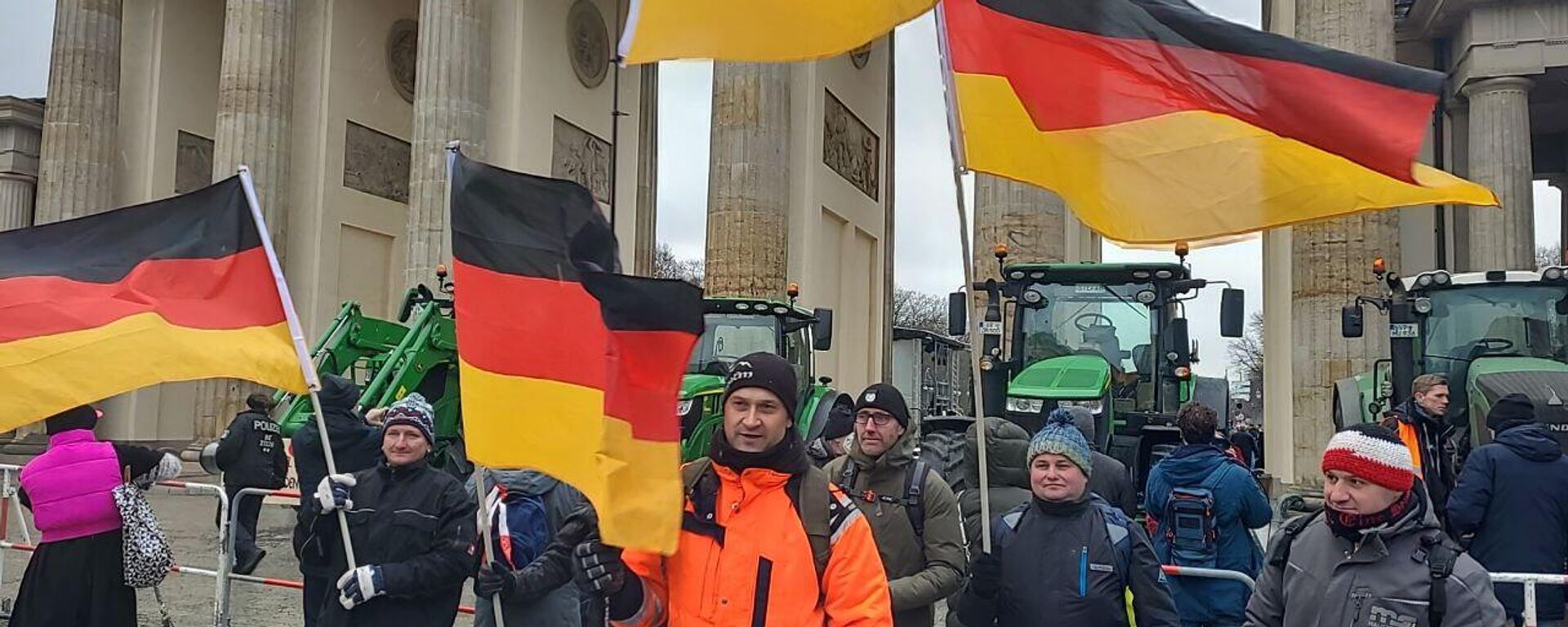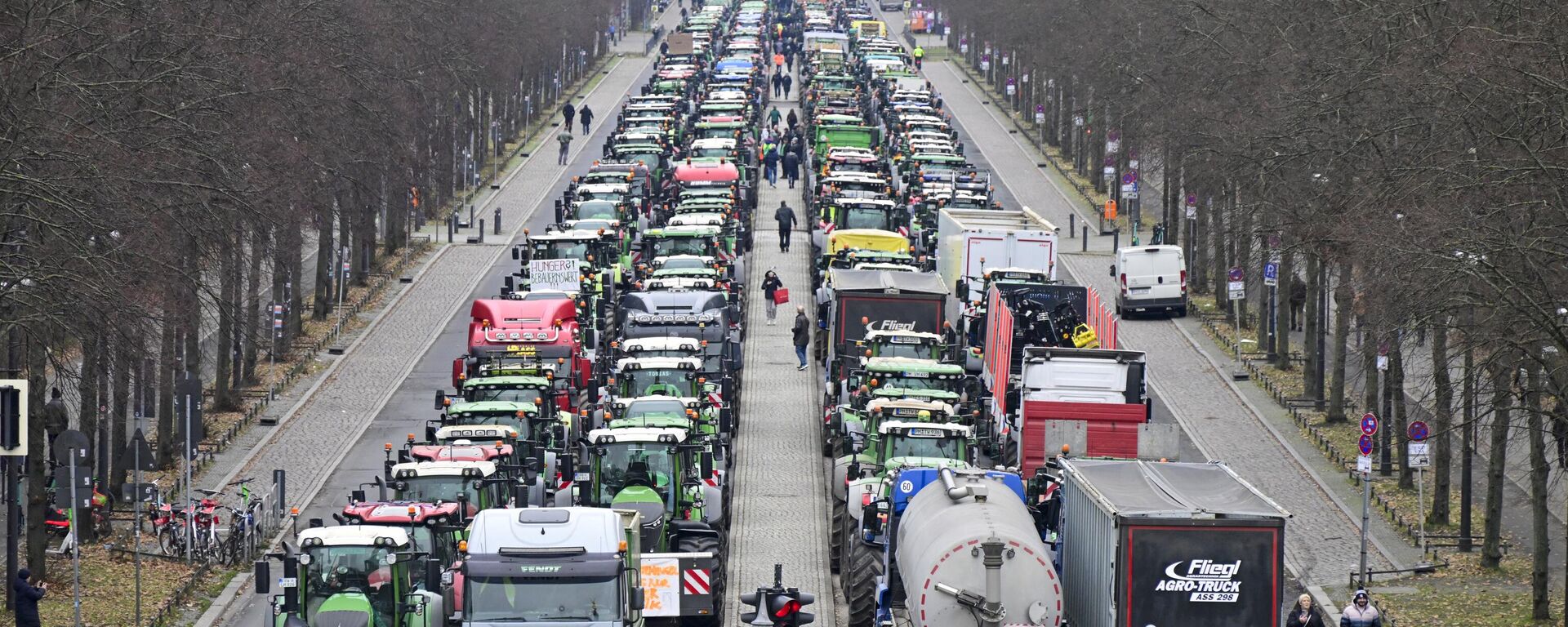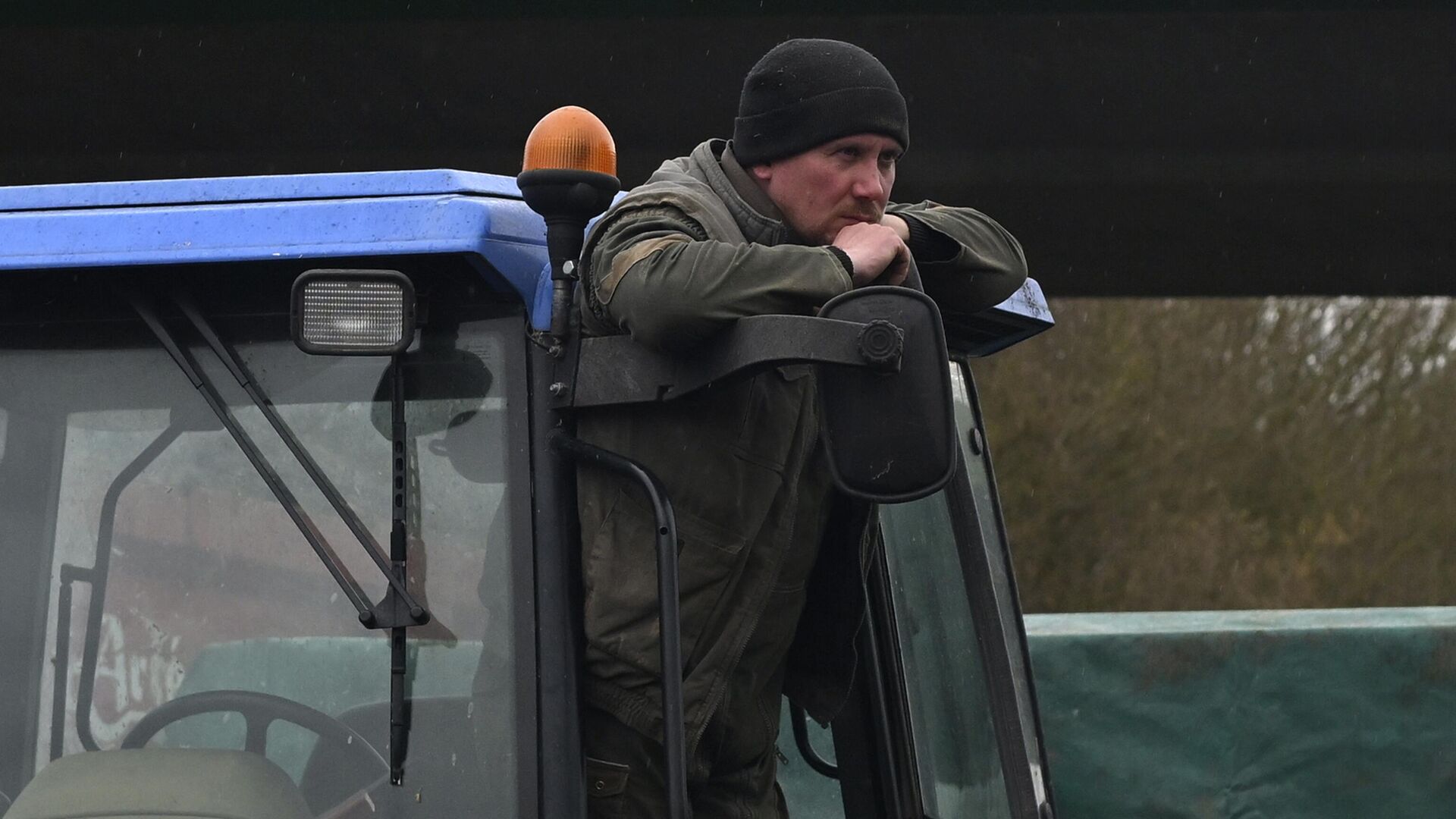https://sputnikglobe.com/20240124/eu-forces-farmers-to-tighten-belts-but-eager-to-funnel-billions-into-ukraine-1116368354.html
EU Forces Farmers to Tighten Belts, But Eager to Funnel Billions Into Ukraine
EU Forces Farmers to Tighten Belts, But Eager to Funnel Billions Into Ukraine
Sputnik International
European governments are stripping EU farmers from subsidies and benefits while sending tens of billions of euros to Ukraine, American columnist George Szamuely told Sputnik.
2024-01-24T20:51+0000
2024-01-24T20:51+0000
2024-01-24T20:51+0000
europe
world
ukraine
russia
farmers
protests
eu economy
inflation
economic recession
hungary
https://cdn1.img.sputnikglobe.com/img/07e8/01/18/1116346147_0:0:3072:1728_1920x0_80_0_0_f7ba11da6821fea09ae75a7cf5ddab00.jpg
Farmer protests have engulfed much of Europe over continued pushes by EU governments to cut benefits for the agricultural sector and attempt to stop inflation by artificially suppressing prices.European leaders have explained their decisions to deprive farmers of various subsidies by the lack of funds, and yet EU member states seem eager to allocate tens of billions of euros for the Kiev regime. After the latest €50 billion package was blocked by Hungary, EU officials started considering a new plan to funnel €22 billion in military aid for Ukraine, as per the Wall Street Journal.It appears that ordinary Europeans have grown fed up with the elitist adventurism, as per Dr. George Szamuely, a senior research fellow at the Global Policy Institute.Remarkably, the latest wave of protests involving European farmers and representatives of some other industries coincided with January's World Economic Forum, the epitome of the EU liberal vision."[The] EU liberal order that's prevailing in Europe," Szamuely said. "It's very hostile in general to farming and to what farming is about. I mean, they tend to be hostile to farmers, the work of farmers. But the hostile also generally do agriculture, agriculture, they see as, producing all sorts of things that [are] detrimental to the environment. […] And they produce meat, and meat is not supposed to be good for you. And so this general hostility towards farmers is then reciprocated by the farmers because, of course, this hostility expresses itself in policies that are hostile to farmers."Europe's climate agenda and decoupling from Russia under Washington's pressure has backfired on EU member states' capabilities of developing both industrial and agricultural sectors in various countries of the bloc. Now, EU workers have been asked once again to tighten their belts, prompting the emergence of discontent.
https://sputnikglobe.com/20240115/afd-mp-explains-why-german-farmers-are-up-in-arms-against-scholz-government-1116183896.html
https://sputnikglobe.com/20240108/tractors-block-roads-in-germany-as-farmers-protest-fuel-tax-hike-1116052515.html
ukraine
russia
hungary
Sputnik International
feedback@sputniknews.com
+74956456601
MIA „Rossiya Segodnya“
2024
News
en_EN
Sputnik International
feedback@sputniknews.com
+74956456601
MIA „Rossiya Segodnya“
Sputnik International
feedback@sputniknews.com
+74956456601
MIA „Rossiya Segodnya“
eu protests, farmers protesting across european union, eu farmers protesting against subsidy cuts, subsidy cuts in agriculture, eu sanctions against russia, eu energy crisis, eu inflation, recession, ukraine, eu farmers, wha does eu farmers want
eu protests, farmers protesting across european union, eu farmers protesting against subsidy cuts, subsidy cuts in agriculture, eu sanctions against russia, eu energy crisis, eu inflation, recession, ukraine, eu farmers, wha does eu farmers want
EU Forces Farmers to Tighten Belts, But Eager to Funnel Billions Into Ukraine
European governments are stripping EU farmers from subsidies and benefits while sending tens of billions of euros to Ukraine, American columnist George Szamuely told Sputnik.
Farmer protests have engulfed much of Europe over continued pushes by EU governments to cut benefits for the agricultural sector and attempt to stop inflation by artificially suppressing prices.
European leaders have explained their decisions to deprive farmers of various subsidies by the lack of funds, and yet EU member states seem eager to allocate tens of billions of euros for the Kiev regime. After the latest €
50 billion package was blocked by Hungary, EU officials started considering a new plan to funnel €22 billion in military aid for Ukraine, as per the Wall Street Journal.
It appears that ordinary Europeans have grown fed up with the elitist adventurism, as per Dr. George Szamuely, a senior research fellow at the Global Policy Institute.
"You have these, the European elites, who pursue policies that are fundamentally unpopular," Szamuely told Sputnik. "I mean, we've got the green energy policy, which is really, you know, you have gone into a high gear. It's clearly coming into conflict with farmers. Then they pursue policies on, for mass immigration, which are also extremely unpopular. And then they pursue war policy, which is costing an enormous amount. I mean, in terms of energy and sanctions. And then they just transfer in, no questions asked, you know, well, €50 billion for Ukraine. So this is actually leading to a lot of political discontent."

15 January 2024, 19:38 GMT
Remarkably, the latest wave of protests involving European farmers and representatives of some other industries coincided with January's World Economic Forum, the epitome of the EU liberal vision.
"[The] EU liberal order that's prevailing in Europe," Szamuely said. "It's very hostile in general to farming and to what farming is about. I mean, they tend to be hostile to farmers, the work of farmers. But the hostile also generally do agriculture, agriculture, they see as, producing all sorts of things that [are] detrimental to the environment. […] And they produce meat, and meat is not supposed to be good for you. And so this general hostility towards farmers is then reciprocated by the farmers because, of course, this hostility expresses itself in policies that are hostile to farmers."
"And so this hostility has now, blown into the, open with this, tax increase on diesel and, in France and then in Germany, where they've withdrawn, these subsidies that they've been having and this on top of the exorbitant energy prices, in Europe, you know, many ways, due to the, the sanctions policy on Russia has led to this explosive mix," he continued.
Europe's climate agenda and decoupling from Russia under Washington's pressure has backfired on EU member states' capabilities of developing both industrial and agricultural sectors in various countries of the bloc. Now, EU workers have been asked once again to tighten their belts, prompting the emergence of discontent.

8 January 2024, 10:57 GMT




